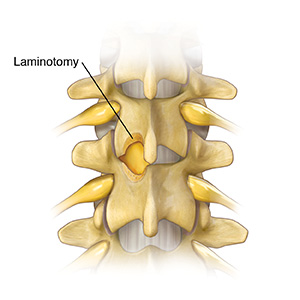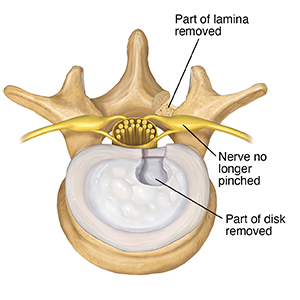What Is Lumbar Microsurgery?
How it can help you
Lumbar microsurgery uses a smaller cut (incision) than traditional lumbar surgery. A smaller cut helps you heal faster. This surgery often eases leg pain (sciatica) from the hip down to the foot. It also:
In some cases, a larger cut may be needed.
Removing bone
During a microdecompression, bone is taken out. First, a small part of the lamina is removed. It is taken from the vertebrae above and below the pinched nerve. Removing part of the lamina is called a laminotomy. Taking out all the lamina is called a laminectomy. If there is no disk problem, the small opening made by this process may take pressure off the nerve. But most often, more bone, ligaments, or both are pressing on a nerve. This bone and the ligaments are also taken out.
 |
| Part of the lamina is removed from the vertebrae above and below the pinched nerve. |
Removing disk
During a microdiskectomy, some disk is removed. In most cases, a laminotomy must first be done to expose the damaged disk. The part of the disk outer wall and soft center that presses on the nerve can then be taken out. Any disk matter that is loose or that may cause problems in the future is also taken out. There is often enough disk still there to cushion the vertebrae.
 |
| A part of the disk is removed to take pressure off the nerve. |
Online Medical Reviewer:
Heather M Trevino BSN RNC
Online Medical Reviewer:
Marianne Fraser MSN RN
Online Medical Reviewer:
Rajadurai Samnishanth
Date Last Reviewed:
3/1/2024
© 2000-2024 The StayWell Company, LLC. All rights reserved. This information is not intended as a substitute for professional medical care. Always follow your healthcare professional's instructions.